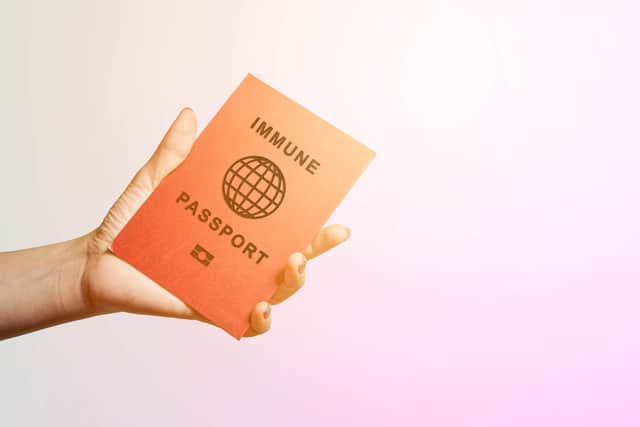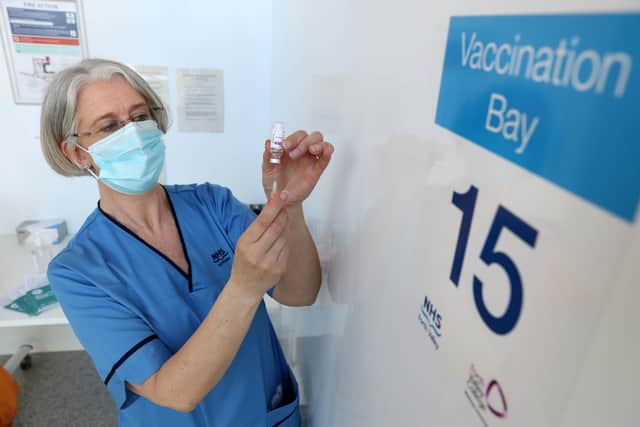Insight: Will vaccine passports be used in Scotland?
It is expected that in less than two weeks, everyone in the top Joint Committee on Vaccination and Immunisation (JCVI) priority groups will have been offered a first dose of vaccine, including all over-50s, unpaid carers and those with underlying health conditions.
As the blue letters mount up and restrictions begin to ease, the obvious question looms ever larger – what next?
Advertisement
Hide AdAdvertisement
Hide AdSo far vaccination offers no change to the rules people are expected to abide by and there is no distinction between those who have had a jag and those who haven’t.


But that could be set to change, as the concept of ‘vaccine passports’ rises ever further up the national agenda.
There has not yet been enough certainty that vaccination reduces transmission for a jag to lead to any meaningful change, but evidence is growing. The Scottish Government is now “thinking about” vaccine passports, while Prime Minister Boris Johnson believes them to be “definitely” on the cards.
The idea raises several questions – how would they work? Would there be a Scottish, a UK-wide, or a worldwide scheme?
And there are some concerns, from civil liberties campaigners warning of a “national ID card”, to those who are unable to receive a vaccine for health reasons, to young people complaining of older generations having all the fun while they wait their turn.


It was on the grounds of “discrimination” that UK vaccine minister Nadhim Zahawi ruled out vaccine passports in February, saying were not under consideration.
An interim position paper from the World Health Organisation (WHO) also released in February warned the requirement of the passports for travel could result in even greater vaccine inequality, with higher demand from those wishing to travel potentially drawing supplies away from those most at risk of severe Covid-19.
But the UK Government launched a review into vaccine passports after Boris Johnson announced his route map out of lockdown at the end of February. In response, Nicola Sturgeon said she would not “close her mind” to the idea.


Advertisement
Hide AdAdvertisement
Hide AdThe First Minister appears to have further warmed to it since then, telling a Covid-19 briefing on Tuesday this week that vaccine passports “should be looked at”.
“I think we should consider how we use some kind of vaccine certification to open up more in the future,” she said, adding the Scottish Government is “thinking about it”.
“It’s not something that I think is practical right now, but in the future it is possible and I think it’s important that we give it proper and due consideration.”
Mr Johnson said this week there is “definitely going to be a world in which international travel will use vaccine passports”.


Genevie Fernandes, research fellow in Global Health Governance at Edinburgh University, is clear.
“I think whether we like it or not, they're definitely going to be implemented in the near future,” she said.
“Our take on what is going to happen is they will be not mandatory, but they will be implemented across many European countries, at least to begin with, along with other documents such as your negative PCR test.”
Israel’s Green Passes
Dr Fernandes points to the example of Israel, which is the only country so far to roll out a type of Covid-19 vaccine passport.
Advertisement
Hide AdAdvertisement
Hide AdSince February ‘green passes’ have allowed those who have had two vaccine doses to enter venues including gyms, hotels and concerts, and to be served indoors at bars and restaurants.


They come in paper form, with a barcode, and can also be downloaded onto users smartphones in an app.
The Israeli government is now in talks with Cyprus and Greece about a travel bubble, where a green pass would be used to allow Israeli citizens to travel back and forth without having to quarantine.
Dr Fernandes cites this as an example of vaccine passports being used both like a traditional passport, for international travel, and also domestically, for entry to pubs, restaurants and other venues.
“The concept is the same,” she said.
“It's a digital application where you input your details and are given a code, or it’s a document that you show to get entry.”
Several firms have already begun to bank on certification, with cruise lines including Saga and P&O saying they plan to welcome customers this summer who can prove they have been vaccinated.
A range of apps are being trialled by airlines, most of which are based on Covid-19 test results, with the ability to add vaccination data.
There has been some confusion in the UK over what exactly constitutes a “vaccine passport”.
Advertisement
Hide AdAdvertisement
Hide AdA card is given to vaccine recipients in England showing information about which vaccine was received and when the second dose is due, but these have not been implemented by the Scottish Government.
Some cards were given out at the beginning of the rollout, but health boards have said this was in error and has since been discontinued.
Challenges for hospitality
Businesses leaders in hospitality and tourism have called for more information about the practicalities of vaccine certification.
Paul Waterson, spokesperson for the Scottish Licensed Trade Association, said opinion was “divided” on the issue.
If the measure would allow for greater opening rights, pub and restaurant operators would support it, he says, but they are concerned about the detail.
“If us opening without restrictions, and by that I mean the tier system, if opening depended on it, then we would go with it, because it's the only way we're going to get back to some sort of normality,” he said.
“Then we start to go into the detail of this, and how it would be managed, what it means in the sense of segregating customers ... because some will have passports and some won’t.
“How do we actually do this? What are the practicalities?”
Emma McClarkin, chief executive of the British Beer and Pub Association, warned on Friday that vaccine passports would be an “additional burden” to place on pubs, which could “really, really scupper things”.
Advertisement
Hide AdAdvertisement
Hide AdManaging any such scheme would be easier for bigger companies, Mr Waterson says, as with any measure involving admin.
But he adds he is “not too worried” about the challenge of ensuring compliance.
“We have to adhere to the licensing laws every day of the week, we’re used to enforcing them,” he said.
Vaccine passports in the travel industry
Russell Imrie, hotelier and spokesperson for the Edinburgh Hotels Association, echoes the view that anything likely to help ease restrictions more quickly would be welcomed.
“From a hotelier’s point of view, the most important thing after the year that we've just had is for the industry hotel industry to be able to open up, for customers to come and spend money in hotels and for the recovery to happen as soon as possible,” he said.
“If vaccine passports are what gives customers the confidence to travel, gives the health authorities the confidence to be able to loosen restrictions to allow people to travel more widely throughout the UK and internationally, then hotels would obviously benefit from that.”
But Mr Imrie also raises questions over administration.
“How vaccine passports would be administered and managed at a hotel level is something which is an unknown at the moment,” he said.
Whatever the rules put in place, from a tourism perspective Mr Imrie would like to see them standardised across countries, so prospective visitors from overseas would not be drawn to certain areas over others, based on their certificate system.
Advertisement
Hide AdAdvertisement
Hide Ad“It has to be something that the travelling customer regards as being the norm, and not something that they have to think about, [that] ‘if I go to this destination, this city, or this hotel, they require this paperwork or this vaccine passport’,” he said.
“That would become a nightmare to work with.”
Israel has led the global charge on vaccination, with 80 per cent of the population already given two doses, a measure that has been reflected in plummeting infection rates and hospitalisations.
But some issues have also been raised. Workplaces and schools are faced with a dilemma if people refuse to be vaccinated and at least one case has already ended up in court.
Possible discrimination
Dr Fernandes warns passports would discriminate against those who are unable to get the vaccine for some reason, including those with some health conditions.
In her view, this is one of the reasons why they will probably be combined with some kind of proof of a negative Covid-19 test, with people given a choice between the two, but vaccination being the easier and cheaper option.
National clinical director Jason Leitch has called the idea “enormously complex”.
“I don’t think this is as easy as it sounds at first hearing,” he said on Tuesday.
“It is enormously complex – it has inequalities challenges, and it has challenges around those who are unvaccinated.”
Advertisement
Hide AdAdvertisement
Hide AdProfessor Leitch used the example of children, who are not offered vaccines in Israel and must present a recent negative test instead.
There are currently no plans to vaccinate children in Scotland, but Prof Leitch has said there may be before the end of the year.
Several groups have warned against the “discriminatory” nature of vaccine certificates, including a cross-party group of 70 MPs and peers.
Labour peer and former director of human rights organisation Baroness Chakrabarti said on Friday they could create a “checkpoint Britain”.
“It’s counter-productive because we have got one of the highest confidence levels in vaccine uptake,” she told BBC Radio 4’s Today Programme.
“History demonstrates, even in Britain, that when you inject an element of compulsion into public health measures, such as vaccination or symptomatic testing, you actually encourage resistance and scepticism amongst the population.”
Dr Fernandes also points out ethical issues in terms of inequality, with many young people in Africa and South Asia unlikely to access a vaccine in the near future.
The ethics of civil liberties in relation to vaccine passports is a “dicey issue”, she says.
Advertisement
Hide AdAdvertisement
Hide AdDr Fernandes said: “There has to be clear transparency about how the data is stored, where it's being used and for what.
“If data is stored, then it should be stored in a central protected server, and it should be used only for the purposes that they say they're going to use it for, and not for connecting it with any other non public health related purposes like visa applications or anything.”
Not the first of its kind
But Covid-19 passports would not be the first kind of vaccine certificate to be introduced.
Many countries already require proof of vaccination against some diseases, such as yellow fever, before entry.
The difference is that Covid-19 vaccination status is likely to require further updates, says Dr Fernandes.
“With yellow fever you get one vaccine and you're sorted for life,” she said.
“You don't have to take another vaccine, whereas for Covid we're still learning about the disease, we're still learning about the immunity … there are current debates within the scientific community about it becoming an annual process, like the flu vaccine.
“So that is one difference. That's why you have to have some sort of a digital mechanism that you keep updating.”
Advertisement
Hide AdAdvertisement
Hide AdDr Fernandes points out that many people already have experience with the state requiring proof of their medical information, especially those who have moved from lower income countries to higher income countries and have been screened for tuberculosis or other diseases.
Attitudes towards vaccine passports tend to mirror those towards vaccines and other Covid-19 related interventions such as lockdown and testing, she says, pointing to higher levels of compliance in East Asian countries and more scepticism and emphasis on individual freedoms in Europe.
“I think these bigger constructs of how individuals see themselves and their relationship with the state, that's where you will find these kinds of differences,” she said.
“The whole idea of getting a vaccine passport is that you incentivise people to get vaccinated. That’s what they’re doing in Israel. When you get both your jabs, you’re allowed to got to a pub, or a restaurant or a concert.
“It’s also good for the local economy, so there’s an individual benefit, and there’s a local economic benefit as well.”
“The only thing is that they shouldn't be made mandatory.”
A message from the Editor:
Thank you for reading this article. We're more reliant on your support than ever as the shift in consumer habits brought about by coronavirus impacts our advertisers.
If you haven't already, please consider supporting our trusted, fact-checked journalism by taking out a digital subscription.
Comments
Want to join the conversation? Please or to comment on this article.